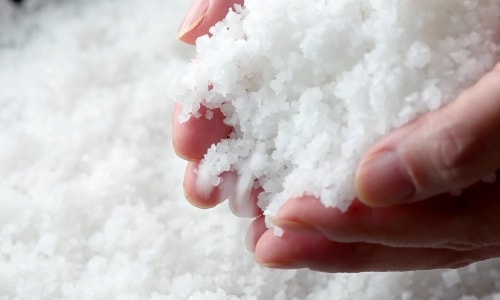Vietnam is among 26 countries in the world with iodine deficiency. The Ministry of Health has proposed to increase iodine in all types of salt used directly in food and salt used in food processing.

The proposal was made by the Ministry of Health in a submission to the Government on amending Decree 09/2016 on fortifying micronutrients in food. The dossier is currently being appraised by the Ministry of Justice and is expected to be submitted to the Government for approval in November.
On November 5, Ms. Dinh Thi Thu Thuy, Deputy Director of the Legal Department, Ministry of Health, said that people nationwide, including coastal provinces in the Central Coast, are deficient in iodine. According to the results of the 2019-2020 general nutrition survey, only 27% of households use iodized salt that meets standards, while the recommendation of the World Health Organization (WHO) must be over 90%. Thus, the number of households using iodized salt (meeting disease prevention standards) is at the lower risk level and does not meet the WHO's recommendations.
"Iodine deficiency in Vietnam is so serious that it has public health implications," said Ms. Thuy, adding that the requirement that processed salt be fortified with iodine is consistent with WHO recommendations and international experience in preventing and combating micronutrient deficiencies.
In fact, Vietnam has required that salt for human consumption, including food salt, must be iodized since 1994, according to Ms. Thuy. Thanks to that, after 6 years of implementation, Vietnam has eliminated iodine deficiency and achieved international standards in 2005.
Believing that Vietnam had eliminated the shortage and people maintained the habit of using iodized salt, in 2005, the Government issued Decree No. 163 to replace the previous Decree to switch to a new management mechanism. In which, the regulation on the use of iodized salt in food processing is no longer mandatory.
According to the results of the evaluation of 9 years of implementing Decree No. 163/2005, less than 50% of provinces and cities have achieved the coverage rate of iodized salt that meets disease prevention standards. In 2014-2015, the goiter rate in children aged 8-10 increased to 8.3%.
Faced with this situation, in 2016, the Government issued Decree 09 on fortifying micronutrients in food. It stipulates that "salt used for direct consumption or in food processing must be fortified with iodine". To date, iodine consumption has increased, but is still below WHO's recommended levels.
Ms. Thuy said that when the Government assigned the drafting of a dossier to amend Decree 09, the Ministry of Health received many opinions and recommendations from businesses about removing the mandatory regulation that salt in food processing must be fortified with iodine.
The reasons given by businesses are that "using iodine-fortified salt changes the color, taste or negatively affects consumers' health" or "causes difficulties in exporting because Vietnam requires it but other countries do not",...
However, the Ministry of Health said it has not received any scientific evidence related to the above reasons. At the meeting with businesses on October 30, the Ministry of Health's leaders expressed their willingness to coordinate with companies to research and clarify the effects of iodized salt on their products.
In case scientific evidence shows that the use of iodized salt in food changes the color, taste or has negative effects on consumers' health, the Government will be asked to exclude these products in the Decree.
Iodine is a micronutrient. The body uses this substance to synthesize thyroid hormones, which are essential for the development of fetuses and children. Prolonged iodine deficiency can lead to neurological damage in fetuses and young children. In pregnant women, it can lead to miscarriage, stillbirth, premature birth... Risk of goiter, neurological and mental damage in young people and adults who lack this substance.
Symptoms of iodine deficiency are fatigue and lethargy, so many people do not pay attention. According to the Ministry of Health, iodine deficiency causes 5-10% of cases of mental retardation, 20-30% of people with goiter. Many people lack energy, reduce their ability to work, and affect their health.
Statistics from the Global Iodine Network (IGN) database show that 126 countries have mandatory fortification regulations, of which 114 countries require the use of iodized salt in food processing.
In ASEAN, 8 countries apply mandatory iodine fortification policies for table salt and salt used in food processing, including: Myanmar, Thailand, Laos, Cambodia, Singapore, Indonesia, Malaysia and the Philippines; only 2 countries apply incentive policies: Singapore and Brunei.
TH (according to VnExpress)